Fighting Fat with Science
Are you sitting comfortably? You might want to stand up, because we'll be hearing why, in health terms, sitting is the new smoking! We're also taking a look at the science behind weight loss and why shedding extra pounds is so difficult. Plus news of why colds really do prefer the cold, why most of the world's fossil fuels need to stay in the ground if we're to meet climate change targets, and home from home: how scientists have discovered Earth's twin, deep in outer space...
In this episode

01:06 - Why colds are more common in winter
Why colds are more common in winter
with Akiko Iwasaki, Yale University
It was dismissed by doctors for decades as a myth. But now, scientists have proved that the winter weather really can increase your chances of catching a cold...
Yale University's Akiko Iwasaki has found that when the cells in our noses are infected with viruses, they sound a chemical alarm to help other cells to fend off infection. But at lower temperatures, this doesn't work so well, giving an attacking virus an advantage and partly explaining why colds are much more common in winter, as she explained to Chris Smith.
Akiko - It's been known since the 1960s that the common cold virus or the rhinovirus replicates at a cooler temperature found in the nose. However, it was not known why the virus replicates better in this cooler temperature.
Chris - When you say the virus replicates better in the cooler temperature in the nose, are you saying then that because the nose is colder, that the virus grows better?
Akiko - Yes, the virus grows better in the nose temperature.
Chris - How do we know that?
Akiko - This was done in the 1960s when people used to try to culture the virus from the nose of people with the common cold symptoms. And they couldn't grow the virus well at the typical temperature of 37 degrees. But when they reduced the temperature of the incubator to 33 degrees, the virus could grow.
Chris - 37 degrees being normal body temperature.
Akiko - That's correct.
Chris - Would the inside of the nose normally be about 33 degrees then because it's exposed to cold air?
Akiko - That's correct, yes. Typically, 32 to 33 degrees in the nose.
Chris - And had everyone concluded that the virus wouldn't grow because the virus "prefers" a cooler temperature? Was that their deduction but they just didn't know why?
Akiko - That's correct and many studies have been done in looking at whether there is something about the virus that grows better in the cooler temperature of the nose. For instance, people have taken apart bits and pieces of the virus to see whether each component of the virus works better at the cooler temperature. But none of these studies have revealed the mechanism for this.
Chris - So, they all drew a blank?
Akiko - Right.
Chris - Was your suggestion then that well, if it's not the virus, perhaps it's actually the person?
Akiko - That's right. So, we started to look at this question from a different angle, how the viruses are detected by the immune system in general. So, we've been studying these molecules known as sensors that detect virus RNA inside the cell.
Chris - This is the genetic material of the virus, isn't it?
Akiko - Right. So, the rhinovirus has a RNA genetic material inside of it. The host cell can detect the presence of this RNA inside the cell when the virus grows inside the cell.
Chris - A bit like a sort of tripwire. There's a chemical tripwire. The cells says, "Aha! I've got this funny genetic material in here that shouldn't be here" so it knows that it's been infected.
Akiko - That's correct and these molecules are collectively known as sensors. And so, we have mice from which we've taken away these sensors. And so, we can study the importance of each of these sensors in blocking the virus from growing. When we looked at the ability of the virus to grow, in the absence of these sensors, they could now grow even at the higher temperature of 37 degrees, indicating that it's not the intrinsic property of the virus, but it's the host immune response that dictates which temperature the virus can grow in.
Chris - Why hasn't the virus, given how common these rhinoviruses are (I guarantee everyone listening to this has probably got a cold or they're getting over a cold, probably caused by rhinovirus, right now) why hasn't the virus evolved away around that? It seems so simple because it's literally stopping it doing what it could do. It could grow all over the body if it were to surmount that temperature problem then.
Akiko - That's correct. In fact, that's a very good question. We think that the rhinovirus actually prefers to replicate in the nasal cavity because it is easy to transmit the virus from the nose to the next person by either touching the nose or sneezing or other means.
Chris - Is it not possible to come up with some kind of drug or a nasal spray that could tweak the sensors in our cells in the nose or even give us an artificial sensing system so that tripwire that enables the cells to detect a virus growing in our nose goes off at the lower temperature better.
Akiko - Yes, that would be an innovative way to deal with this problem. But there's another problem with this - is that we found not only the sensors of the virus don't work as well at the lower temperature, but also the interferons that are produced as a result of the sensing don't stimulate the neighbouring cells as well. So, these interferons are molecules that are secreted from infected cells to try to alarm the neighbouring cells from becoming infected by the virus.
Chris - Like a burglar alarm going off when there's been a smash and grab in one cell by a virus.
Akiko - That's correct.
Chris - They're telling the cells next door, "Watch out because there might be a virus in the neighbourhood."
Akiko - That's right. And usually, this alarm works very well. But what we found is that in the nasal cavity temperature, the alarm system also doesn't work very well. So, you would have to overcome both of these issues in order to prevent the virus from growing in the nose.
Chris - It sounds to me like we're stuck with the common cold then. The way you're telling this it sounds like really actually, we're going to have to live with it.
Akiko - Maybe. The other way to deal with it is I guess to warm up your nose to the temperature that's not permissive for the virus to grow.
Chris - What would you recommend then, a large whisky or something to give you a nice warm red nose?
Akiko - That's a possibility. I don't know how much the whisky increases the nasal cavity temperature. I don't think anyone has measured that.
Chris - I'd be very happy to help with that particular experiment!
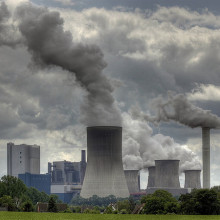
07:19 - The fossil fuels we can't touch
The fossil fuels we can't touch
with Christophe McGlade & Paul Ekins, UCL
Climate change and global warming are strongly linked to rising carbon  dioxide or CO2 levels in the atmosphere, which partly come from burning fossil fuels. The world's politicians have agreed that a 2-degree Celsius rise in global temperature is as much as the world can take. Recent research, published in Nature, has revealed that many of our untapped fossil fuels with have to stay firmly underground if we are to avoid this 2-degree rise.
dioxide or CO2 levels in the atmosphere, which partly come from burning fossil fuels. The world's politicians have agreed that a 2-degree Celsius rise in global temperature is as much as the world can take. Recent research, published in Nature, has revealed that many of our untapped fossil fuels with have to stay firmly underground if we are to avoid this 2-degree rise.
Researchers Cristophe McGlade and Paul Ekins from University College London explained the work to Kat Arney, also discussing the tough choices the world will have to make if we want to avoid the worst-case-scenario...
Cristophe - This model looks out into the very long term up to 2100 and says, how can we best meet all of our energy needs in the future in a global context. It finds the cheapest way of satisfying all of the energy uses we might have in the future - how we're going to heat our buildings in the future, what we're going to use to drive our cars, how are we going to produce all of the industrial goods? For this work, what we did was we imposed this 2 degrees constraint on the model. So, we said that carbon emissions resulting from use of oil, from gas and from coal cannot result in a temperature rise which is above the 2 degrees target.
Kat - And so, when you look at this, how much can we use of the stuff we know is there in the Earth?
Cristophe - Of the coal reserves, only about 20% of these can be used. So, that means that 80% of current coal reserves have to stay in the ground if we don't want to exceed 2 degrees. For oil, it's about a third needs to stay in the ground and for gas, it's about half of what we think is currently economic to extract has to be left in the ground.
Kat - This seems pretty significant because obviously, there must be energy companies who have made predictions, who were going out looking for more oil and stuff in the ground. We talk about fracking, we talk about exploiting the oil that's under the Arctic. It's a bit difficult to say to them, "You know what guys, you can't even take the stuff that you think you've got."
Cristophe - Absolutely and there's a big inconsistency currently between what trajectory the world is currently on and what people have agreed to. So yes, the fossil fuel companies which are continuing to explore for new resources need to be aware that this is completely inconsistent with the 2 degrees target.
Kat - Oil and gas, and coal reserves that we have aren't equally distributed between all countries. So, how do some of the things shape up in terms of which countries have to be on the strictest carbon diet?
Cristophe - Generally, those regions which have the most resources currently are going to have to go on the biggest carbon diet, as you call it. For coal, the United States and Russia can only use less than 10% of their current reserves. In the Middle East alone, there's about 260 billion barrels of oil. That's the entire oil reserves of Saudi Arabia which needs to remain in the ground if we don't want to exceed this 2 degrees.
Kat - One of the things that comes out of your paper is that we can't even burn the resources that we know that we have and yet, companies are exploring in places like under the Arctic, we're looking at technologies like fracking which is very contentious at the moment. You're calculations would suggest that this is basically a waste of time.
Cristophe - Yes. So, within the model, we identify all of these different resources that are out there and you mentioned the Arctic. We can look at, under this 2 degrees scenario, which of these resources are actually used and the results suggest that actually, the Arctic oil and gas, and there might be quite a lot of oil and gas out there isn't required if we want to stay within 2 degrees. Some of the other sources you mentioned, you mentioned shale gas from fracking, there is some potential for that to be used particularly if we have a rapid reduction in coal consumption in the future, some gas will have to come through. And some of that gas can be shale gas. However, if countries such as the UK decide to develop its own shale gas resources, it has to be aware that as a result, someone else somewhere else isn't going to be able to use all of their reserves. So, there's always this trade-off between, if we exploit here, someone else has to not exploit somewhere else.
Paul - It's an enormous challenge because countries quite legitimately regard these resources as theirs and the decision whether they use them or not is their decision. They will need to agree not to use some resources somewhere. The countries that agree not to use their resources, they will probably wish to be compensated in some way. Those kinds of arrangements need to be on the table in the climate change negotiations.
Kat - Climate change is a global problem. It needs all the leaders of all the countries in the world to work together. Some countries say, "Well, no. we want to carry on. We want to develop. We want to use our resources." Is there hope realistically that countries can actually work together and come to these solutions. What's your personal feeling on this?
Paul - Yes, I'm very hopeful because I think increasingly, it will become obvious that climate change is something which they very much need to avoid. It may be true that money makes the world go round, but money doesn't go very far if you haven't got a liveable climate.
Kat - The projections in this paper go up to 2100. If you could maybe paint me a picture, perhaps over the next 20, 30, 40 years, how you would like see things changing?
Paul - Yes, things do change quite dramatically in the world in which we live over a period of two decades. So, I mean anyone who's more than about 40, if they look back 20 years, many of the things they now take for granted were not even dreamt of. It is my firm conviction that if we were to bite the bullet of low emission, energy systems and agriculture, by the time we got there and looked back, we wound wonder why we had thought it was going to be so painful. Because many of these technologies already exist, we can invest in them. A lot of them are not much more expensive than the technologies they're going to be replacing. So, my dream scenario is that both in the UK and globally, governments recognise the urgency of this issue and they start to do things like pricing carbon which will send investment in a quite different direction so that these low-carbon technologies become much more widely installed, emissions start to fall and publics become much more confident about the kind of trajectory that is possible.
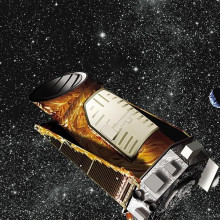
13:41 - A new Earth-like planet
A new Earth-like planet
with Willie Torres, The Harvard-Smithsonian Center for Astrophysics
This week, scientists using the orbiting Kepler telescope to look in deep space for other Earth-like planets announced that they found the closest matches yet for our Earth. The nearest is still over 500 light years away and the sky is red, but otherwise, it looks ideal and the temperature is just right for liquid water to exist. Graihagh Jackson spoke to the project leader, Willie Torres from the Harvard-Smithsonian Centre for Astrophysics.
for other Earth-like planets announced that they found the closest matches yet for our Earth. The nearest is still over 500 light years away and the sky is red, but otherwise, it looks ideal and the temperature is just right for liquid water to exist. Graihagh Jackson spoke to the project leader, Willie Torres from the Harvard-Smithsonian Centre for Astrophysics.
Willie - Kepler is a spacecraft launched by NASA in 2009 that was designed to stare at about 100,000 or 150,000 stars for 4 years continuously, looking for changes in brightness that might signal the passage of a planet across the disk of a star.
Graihagh - How do you know that they're planets and not something else transitioning past the star?
Willie - There are many other phenomena that can mimic the signal. One example would an eclipsing binary, a pair of stars that go in front of each other. So, it's up to the scientist to investigate the target in gory detail and determine the likelihood that it is a planet as opposed to some other phenomenon that has nothing to do with a planet.
Graihagh - And that's what you've been doing with your study just released this week.
Willie - That's correct. Of the 12 candidates that we investigated, we were able to confirm 11 of them as being true planets with a very high level of confidence. This essentially doubles the number of planets that are in the habitable zone of their stars and are similar to the Earth in size.
Graihagh - What's so novel about this study because I'm sure scientists have identified, I think something in the region of a thousand exoplanets? So, what's different about your study from all the other previous ones?
Willie - Well, I think the main result is that two of the planets that we have validated are the most similar to the Earth of all the planets known so far. If you consider both their size and the energy they receive from their star jointly. So, if you consider those two conditions that are required for habitability, these two are the most Earth-like planets that we know of so far.
Graihagh - And do these two planets, these particularly promising ones, do they have a name?
Willie - They have numbers. One of them is Kepler 438b and the other one is Kepler 442b.
Graihagh - Do you have pet names for them? They're quite unimaginative.
Willie - Yeah. Unfortunately, that's the way this works. We have so many of these now that you have to give them numbers.
Graihagh - How far away are these planets that we're talking about? Surely, they're hundreds of light years away?
Willie - The range of distances of the 8 planets that we have validated ranges from about 500 light years to about 2500 light years. So, they're pretty far away.
Graihagh - So, my question is then, given that they're so far away, is there any point in really looking at them because we're never going to get there realistically, certainly in the next few hundred years?
Willie - That's a good question and the answer is yes. It is very important to look at these and the reason is that 20 years ago, we didn't know of any planet outside of the solar system. Now, we have approximately 1,000 planets discovered by Kepler and many more discovered from the ground. We are actually talking about now, looking at their atmospheres, looking for biomarkers. Biomarkers are signatures of gases in the atmosphere that could be produced by life. and I anticipate that with the new generation of very large telescopes that will be available 5 to 10 years from now, we will be able to study the atmospheres of many more planets, and actually, be able to look at signs of life as we know it.
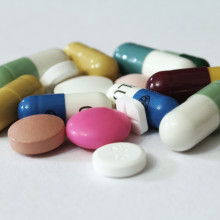
17:54 - New antibiotic breakthrough
New antibiotic breakthrough
with Kim Lewis, Northeastern University
The world is facing a medical crisis where bacteria are growing more and more  resistant to antibiotics, while no new ones are being discovered. This could mean that we are eventually in a position where we can no longer treat once easily curable diseases.
resistant to antibiotics, while no new ones are being discovered. This could mean that we are eventually in a position where we can no longer treat once easily curable diseases.
This week, however, a new set of antibiotics have been announced by researchers in Northeastern University, which might revolutionise the field. Lead researcher Kim Lewis outlined the history of the problem to Chris...
Kim - The problem began about 40 or 50 years ago when it turned out that soil microorganisms that we could culture in our laboratories, to isolate antibiotics from, are very limited resource. They make about 1% of the total diversity of the microorganisms and the bulk of them are unculture'able: they will not grow in our lab. and so, in the absence of discovery and introduction of new antibiotics, our pathogens developed resistance and this resistance is now spreading faster than we can introduce new compounds.
Chris - Can we not just do some very clever chemistry and come up with new chemicals, try those and turn those into antibiotics?
Kim - Clever chemistry so far has largely not worked. The reason for that is that bacteria are very well protected. They don't want foreign molecules to penetrate into their cells. Antibiotics evolved over millions of years to reach the penetration barrier. We have not yet figured out how to do that with synthetic compounds.
Chris - Therefore, your approach is to say, "Well, given that we've only got antibiotics from the small minority of soil bacteria that will grow in our laboratory, what about the vast majority that won't? What kinds of chemicals could they be harbouring? Can we exploit them?"
Kim - Exactly.
Chris - So, if they won't grow in your laboratory, how can you do that?
Kim - Well, then you do the exact opposite. We came up with a gadget that allows us to grow them in their national environment. And that's how we get access to uncultured bacteria.
Chris - Why won't these bugs grow in your laboratory normally? What stops them?
Kim - I do not have a complete answer to that question, but one thing that we did find is that at least some of uncultured bacteria depend on growth factors that come from their neighbours. You do not know where those growth factors are they're not going to start growing.
Chris - In other words, you need to recreate the environment that they would be in in the soil, more faithfully than a petri dish is capable of doing and that's why they won't grow at moment.
Kim - At least for quite a large number of cases, yes.
Chris - So, what does your gadget do to surmount that problem?
Kim - It's very simple. We take a sample of soil, dilute, mix with agar and then...
Chris - This is the stuff that cultured dishes contain - the growth medium?
Kim - Right. Instead of pouring it in a petri dish as you would normally do, we sandwich between two semi-permeable membranes that have pores, big enough for molecules to pass through but not big enough for bacterial cells. In a cell contraption, we call it a diffusion chamber, it then goes back into the soil where the sample originated from. This essentially tricks bacteria. They don't know that something happened to them. Everything diffuses through the chamber and they get all the growth factors that they need. They start growing and form colonies. Once a colony forms, that colony will then start growing on a petri dish in the lab. so, it looks like the main bottleneck in accessing uncultured bacteria is to get that initial growth into a colony.
Chris - Having done that, did you find some new molecules, some new compounds?
Kim - Yes. So far, 25 new antimicrobials were discovered and the compound that we're discussing today - teixobactin is the latest and probably the most exciting. The bacteria that it targets are called gram positive bacteria.
Chris - What effect does the teixobactin have when it hits these gram positive bugs like Staph aureus of which MRSA, the hospital superbug is a member, isn't it?
Kim - Yes.
Chris - What does it do to those bugs?
Kim - It targets a polymer that is needed to build the cell wall of bacteria. If you add this antibiotic, you see that the culture very rapidly lysis. It just clears.
Chris - How did you test it then?
Kim - We tested it in mice that are infected with Staph aureus, with a multidrug-resistant strain that is hard to kill. This compound, injected into a mouse cured it of a blood infection, of thigh infection, or of a lung infection with another pathogen that causes Streptococcus pneumonia.
Chris - Were the mice still healthy afterwards?
Kim - Yes.
Chris - So, it looks quite promising.
Kim - It looks quite promising and mice are not a bad predictor of how compounds will behave in humans.

24:25 - Why are people prone to gaining weight?
Why are people prone to gaining weight?
with Dr Giles Yeo, University of Cambridge
 Being overweight is a problem for millions of people worldwide, and is the cause of many life threatening conditions. But why do people struggle so much with weight loss, and are some techniques, such as calorie counting, misleading?
Being overweight is a problem for millions of people worldwide, and is the cause of many life threatening conditions. But why do people struggle so much with weight loss, and are some techniques, such as calorie counting, misleading?
Giles Yeo, a geneticist from Cambridge University, looks at the genetic and metabolic reasons for weight gain. He talked to Chris Smith about why obesity is a growing problem in many cultures, and started by explaining what fat actually is.
Giles - Fat gets a bad rep, but we really needed to survive because fat is the group of cells that actually, you use to make long term energy storage,and you need it to keep you alive.
Chris - Indeed because if we have too little fat then women don't have any capacity to reproduce. for example, the body uses it for various signals.
Giles - That's correct. So, you need to have enough fat in order to keep your various biological functions going because how much fat you have indicates how long you can last without food.
Chris - How does my body therefore regulate how much fat I've got?
Giles - a fat, although is there and is a storage organ, also releases hormones. What happens is these hormones they call adipokines, but they circulate in the blood and they signal to the brain. the more fat you have, the more of these signals. And so, your brain is exquisitely sensitive to how much fat you actually have sitting in your body.
Chris - Therefore, it interprets how well fed you are based on the levels of those chemicals in the blood.
Giles - Absolutely, how long you can last without food.
Chris - Does that also set appetite then?
Giles - Okay, so your brain regulates food intake, not only from the fat signals which is your long term stores, but also from the gut signals which are your meal to meal variation. Okay, so what I had last time, how many calories did I have last time. it integrates these two signals and then supposedly then controls your feeding behaviour. So, it influences what you then eat the next time around. The problem is, for the vast majority of our human evolution, we have been evolving in a time when there was too little food rather than too much food. So, we are very, very sensitive to having too little food and so, when your brain makes you eat when there's food to make sure that you can survive.
Chris - We are therefore effectively slaves to our genetic evolution because we've evolved not knowing where our next meal is coming from, we are now genetically programmed to try to avail ourselves of all the energy we can.
Giles - Yes. That is actually quite accurate.
Chris - Why is it then that some people can exist in the environment that we have created for ourselves and not gain weight whereas the majority of the population do?
Giles - Okay, so that is the very, very key question. What is clear is that because the prime directive for human beings is to eat enough to reproduce. That's pretty much it. eat enough to survive long enough to actually reproduce. All of the pressure has been to - well, what happens if there's not enough food? Whereas, there has been no selection pressure to say, there's too much food. Well, aside from maybe the sabre-toothed tiger making you too big, but otherwise, there is not a big strong selection pressure for eating too much. So therefore, there is a more natural variation in how one responds to an environment where there's too much food.
Chris - Given that variation potential, does it mean that I might extract different amounts of energy from the food I eat than you do? So, we may eat the same thing. It says on the packet there's 300 calories in this, but the amount of energy you will extract when you eat it may be wildly different than the amount that I get out of it.
Giles - I think there are two questions there. The first is, how do you deal with energy compared to how I deal with energy. So, if we're eating exactly the same type of food, how you or someone else might do, yes, there are going to be subtle variations in what we call energy partitioning. So for example, maybe you may eat a calorie, store half of it and burn half of it. maybe I, store 0.6 of it and burn 0.4 of it. okay, so that's the kind of thing that is there. So, there are definitely differences between how people burn their calories. Your second question has to do with calorie counting so to speak. And in many ways, calorie counting seems to make sense. "Oh! I need to have X hundred calories in this particular meal" because a calorie after all is a unit of energy and it's physics. So, a calorie is a calorie and it should be a calorie whatever you eat. The problem is, how you actually access it when it actually gets down to use. So for example, when you take 100 calories of glucose for example and you eat it, you're likely to get 100 calories of glucose out whereas if you have 100 calories of celery, I think you're likely to take...
Chris - Negative energy.
Giles - Exactly, negative energy and it is negative energy. You're likely to take (I'm making it up now) 110 calories in order to burn those 100 calories. Now, those are the two extremes. But if we then imagine somewhere in the middle where you have a processed mince beef meal as an example, compared to a steak, the energy you need to choose actually break down the steak compared to actually eat the slop that is there are going to be very, very different. So yes, it is the sum total of how much energy you get from a specific food that makes a difference at the end.
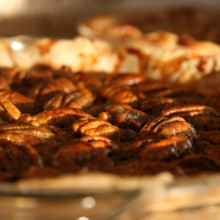
29:27 - An ingredient to make you feel full
An ingredient to make you feel full
with Professor Gary Frost, Imperial College London
Feeling full is our body's way of telling us we've had enough, and that maybe  reaching for that last wafer thin mint isn't the best idea. But often this feeling doesn't kick in until we've already overindulged, especially when dieting.
reaching for that last wafer thin mint isn't the best idea. But often this feeling doesn't kick in until we've already overindulged, especially when dieting.
Researchers in London recently completely clinical trials of a new "secret ingredient", which can trick your body into thinking it has eaten more than it has by exploiting a system in place to avoid over-eating. Gary Frost from Imperial College London explained first to Kat Arney why we feel full when we overeat.
Gary - It's really complicated and we don't quite understand at the present time. there's lots of different signals that occur in the gut and just after you eat, some of these are generated by nerves. Some of these are generated by hormones.
Kat - What sort of things? They just signals to our brain going, "You know what? Put the fork down."
Gary - Absolutely right. they do exactly that. they send signals probably to specific areas of the brain, the hypothalamus and the brain stem. They tell your brain that you've had enough. But the brain can override that if it sees something that it really likes.
Kat - Tasty, tasty pie.
Gary - Absolutely right.
Kat - So, you're actually looking at how you can hijack this system to make us think that we are fuller and back away from the pie. What did you start looking at?
Gary - Well, we've known for some time that deep down in your gut, in the colon, there are special molecules that are developed there by the bugs that live there. These molecules can actually signal and cause a release of appetite regulating hormones from your colon and it's that that we've been looking at, is that these very small fatty acid molecules that actually cause the release of these hormones that actually stop you eating.
Kat - So, it's food getting to the bugs in our gut that then make this signal and stop me from eating.
Gary - That's correct. That's absolutely right. but unfortunately, where we currently live, the actual types of food, because these are dietary fibres, the amount that we need to actually do that, we just can't eat enough at the present time. it was different if you live in Africa or somewhere where you have a very traditional native diet. But in the western world, we don't eat close to enough to actually do that.
Kat - Tell me about how you're trying to hack this system, how you're trying to use these chemicals to make a way of making people feel fuller.
Gary - It takes a bit of clever technology which has been developed by our research partners in Glasgow where we take those molecules - so short chain fatty acids and we attach them to a dietary fibre. So, a dietary fibre can't actually be broken down by the enzymes in your small bowel. So, what it does, it means that the actual short chain fatty acids hitch a ride on the dietary fibre and they get all the way down into your large bowel, into the colon where the bugs then actually chomp up the dietary fibre and release the short chain fatty acid. That actually enhances the amount that's there and releases the actual hormone that actually reduces your appetite.
Kat - So, the idea is you could add this to food say, a pie, if you put this in with the pie filling then your pie would make you feel a lot fuller and you wouldn't want to eat so much of it.
Gary - Well, you seem to be a bit stuck on pies but generally, the idea that this has been developed as a food ingredient because obviously, what we want to try and do, because as you've just heard, weight gain in adults is so widespread, you've got to develop systems that are on a population basis. So, this is an attempt to do exactly that. it's to develop a very safe food ingredient that will suppress appetite in people who are actually concerned about weight gain.
Kat - It does sound great, but where is this at the moment? Have you tested it in clinical trials? Are there any risks for example like, could you overdose on it?
Gary - Well, the paper that we released just before Christmas - all the testing was done in humans. So, we know that this works. That we see a reduction in weight gain over a 6 months period when humans are given this particular molecule. can you overdose? It's like any dietary fibre. If you eat too much of it too quickly then you're going to get minor effects such as bloating. But if you're actually sensible about what you do, it has very, very few side effects.
Kat - Very briefly, have you actually tried it yourself?
Gary - Yes. We've tried it ourselves in the clinic as part of the volunteers and it does what it says really. It actually causes a short term suppression of appetite. So, you eat it and about 3 hours after you've eaten it, you feel more full.
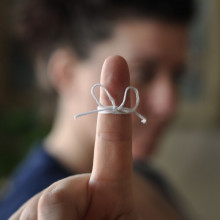
34:49 - Will weight loss boost your memory?
Will weight loss boost your memory?
with Lucy Cheke, University of Cambridge
There are many well known health risks associated with being overweight, including heart disease, diabetes and increased risk of stroke. However another potential cost to being overweight is your memory. Research is also starting to point to a worse memory leading to overeating, as people are less likely to remember how much they've consumed in a day. Lucy Cheke, a psychologist from Cambridge University, told Chris Smith about the research, and offered some pointers to avoid this forgetful eating. She started by explaining how being overweight could affect your memory.
Lucy - Well, it's a very complicated process and it's something that we don't fully understand at the moment. But lots of research both in animals and humans seems to suggest that all the different routes you can get obesity from. So, eating a high fat, high sugar diet or having a genetic issue that causes you to become obese can all lead to changes in your brain. As Giles said earlier, a lot of the genes that we have that control our eating and how we gain weight act in the brain. And so, when you change things in the brain, sometimes you can change how the brain works in a number of different ways as well as on top of why we eat and how we eat.
Chris - What's the evidence that you've got that if someone does gain weight that their memory does go off kilter and by how much does their memory go off kilter?
Lucy - So, this research area is really very young at the moment. So, we're still discovering things all the time. my own research over the last couple of years has looked at overweight and lean people and compared them on memory tests. What we found is that there's about a 20% difference in memory ability between young, otherwise, healthy overweight people and their lean counterparts. We followed that up with a brain scanning study where we looked at the areas of the brain that are associated with memory whilst people are doing this memory test. We found that again, young healthy obese individuals had less activity in the memory-related brain areas. So, the brains did seem to be responding differently.
Chris - But I presume what you didn't do was to take someone slim and put them on a Bridget Jones's Diary force feeding diet to make them gain a load of weight and then re-assess their memory to see if their memory deteriorated having gained weight or have you done that?
Lucy - We haven't done that and that's something we'd really like to do. Obviously, that's something that takes a lot of money and resources and you need to get people willing to come and take a high fat, high sugar diet.
Chris - But has anyone done the equivalent in an animal study because you could for instance force feed a mouse? Just give it too much food and see if the mouse's memory suffers.
Lucy - Yes, absolutely and people have done that. so, people have taken rats and put them on what's called a cafeteria diet. It's a very high fat, high sugar diet where they only have access to really unhealthy foods. What they found is that overtime, these rats gained weight as you'd expect, but they also showed learning and memory deficits and they also found that they had significant changes in the bits of their brain that dealt with memory. So yeah, people have done this in animals. It does seem to have a big effect.
Chris - Do we actually know why the junk food diet is damaging memory and is it reversible? If you slim down your mouse or your rat again, does the effect go away?
Lucy - Well, so it seems that perhaps it does. The research in that direction hasn't been done quite so much. In terms of why it happens, we still don't know. The kind of leading theories are that it's to do with insulin. That even if you're not diabetic per se, if you're overweight then quite often, your insulin levels are different and you fast and your insulin sensitivity is different. Insulin as we know acts in the body to control how much we eat in our blood glucose. But it also acts as a messenger in the brain. And if its ability to act as a messenger in the brain is disturbed, that has a lot of effects in all the areas that rely on it to send messages.
Chris - How might this decrement in memory in someone who's gained weight affect their ability to be compliant with their diet and lose weight afterwards?
Lucy - Well actually, it's really interesting. So, there's been some research showing that what we remember about what we've eaten can dictate how we hungry we feel several hours later, say, the next meal time. so, if we for example watch TV during a meal and don't remember the meal very well, then later on, we can be a lot hungrier than if we concentrated really hard on the meal. Actually, if you trick people into thinking they ate a different amount than they actually ate, then you find that how much they think they ate dictates how hungry they are later on whereas how much they actually ate only dictates how hungry they are immediately after the meal.

39:09 - Lazy ways to lose weight
Lazy ways to lose weight
with Aner Tal, The Food and Brand Lab, Cornell University
 It's that time of year when everyone is struggling with their hastily made resolutions, but why is giving something up so much hard work? The Food and Brand Lab in Cornell University look at the psychology of food and dieting to understand better the way we think about eating. Graihagh Jackson spoke to researcher Aner Tal to find out if they have discovered any tricks of the mind to help people give up their vices.
It's that time of year when everyone is struggling with their hastily made resolutions, but why is giving something up so much hard work? The Food and Brand Lab in Cornell University look at the psychology of food and dieting to understand better the way we think about eating. Graihagh Jackson spoke to researcher Aner Tal to find out if they have discovered any tricks of the mind to help people give up their vices.
Aner - So, the trick is trying to control the environment rather than to control yourself because to control the environment, it takes decisions that are less on an ongoing basis. So, it'll be less demanding. If I keep trying to control myself in an environment where it's difficult to do so, that will take a lot of will power and at some point, I'll run out and slip. On the other hand, if I make a one-time conscious effort to change my environment, because we tend to respond automatically to food and a lot of our eating behaviour is not necessarily conscious. So, I see the cake. Even if I tell myself, "Don't eat the cake" that's because the initial inclination is, this is something I would really enjoy. So, I'm sort of programmed to go and eat it and I need to tell myself no, and it's an active action to override the initial inclination to eat the cake. So, what I want to do is I want to remove some of those triggers for unhealthy eating. So, that can be done by making, eating healthy foods easier, more convenient and making eating unhealthy foods more difficult, making the foods less visible and if possible, making them less appealing. So, I'll give some concrete examples for that. I have an insane ice cream addiction. I can't get enough. Like if there's 5 pints of ice cream in my fridge...
Graihagh - It would be gone by tomorrow.
Aner - Yeah, that's definitely possible. And that's kind of bad for weight control. So for instance, I could have ice cream in my freezer, but keep it in the back so that I can't see it every time I open and then I'm less inclined to - because once I see a stimuli, I'm going to react to it. if it's not visible then I'm going to need to think about it independently and then get it. that might sound like it wouldn't make a huge difference but it would at least for some people.
Graihagh - Hide the food in the back of your cupboard then, check, but what about when you're not at home? For example, eating in a fancy restaurant.
Aner - When I used to go out for dinners with my family to a restaurant, my mum would always tell me, "Don't eat. We're going out to dinner." But sometimes it might actually be a good idea to eat something to make yourself a bit less hungry so you're not going to go wild once you're exposed to all these temptations. And also, part of what happens automatically is, if a food is in front of us, we tend to continue eating it. and that's something we've seen in a broad variety of studies. So, there's a classic study that a director of the food and brand lab did where we had soup bowls constantly refilling themselves through tubes as people ate. And people ate a lot more when the soup bowls continuously refilled themselves because there's food in front of you and you continue eating and the plate doesn't go empty, so you don't know that you're done.
Graihagh - Just like a bottomless pit of soup.
Aner - Yeah, exactly.
Graihagh - How much soup did these people eat?
Aner - That, I have to check. So, this and a lot of the other information, if you want to get actual numbers, are on our website at Food and Brand Lab. if you Google Food and Brand Lab, you can easily get it.
 Graihagh - I did have a look on the website as Aner suggested. People unwittingly ate 73% more soup when they didn't notice their bowl was being refilled compared with people who knew just how much they were eating. What's more is that they reported feeling just as hungry. So, feeling full can simply come down to paying attention to how much you're eating. This idea of avoiding mindless eating came up again.
Graihagh - I did have a look on the website as Aner suggested. People unwittingly ate 73% more soup when they didn't notice their bowl was being refilled compared with people who knew just how much they were eating. What's more is that they reported feeling just as hungry. So, feeling full can simply come down to paying attention to how much you're eating. This idea of avoiding mindless eating came up again.
Aner - One of the studies we recently had published had to do with television viewing and how, if someone watches a TV programme that's more engaging to them, they wind up eating more. Part of that relies on mindless eating. So, the food is right in front of you. You're more distracted so you're going to eat mindlessly to a greater extent. You're paying less attention and you're just eating on autopilot. Eating is very easy. It's something that you don't really need to think of. You just do it automatically. So, making it more difficult for ourselves to eat mindlessly is one trick that people can use to control their eating. And also, changing what you eat mindlessly by changing what's available.
Graihagh - There you have it. hide the ice cream, display the celery and pay attention to everything you eat. And whatever you do, don't eat from a bottomless bowl of soup or in my case, custards.

44:19 - Is sitting the new smoking?
Is sitting the new smoking?
with Dr Michael Mosley, journalist and broadcaster
Are you sitting comfortably? You may want to stand up after reading this. People are spending so much time on their derrieres it could be shortening their lifespans by up to six years, research suggests. This sedentary lifestyle and lack of exercise is one of the contributing factors to the current obesity crisis.
Michael Mosley, broadcaster and author, explained to Kat Arney why sitting is so harmful to your health, and also explained the concept of 'high-intensity training', the fast way to exercise.
Michael - We spend on average, something like 10 hours a day sitting down. In the good old days, people roamed around a bit and they were much more active in their jobs whereas I don't know about you, but I spend an awful lot of time sitting down at my computer, tapping away. The problem is that, what happens is, the glucose you eat in your meal, it all kind of sits rather sludgily in your body because your muscles just don't get active enough. And there are a lot of studies now which suggest, as you said earlier, that being sedentary is almost as bad for you as smoking. And that you cannot undo the damage you do to yourself in those 8 to 10 hours sitting down by than dashing off to the gym or going for a run.
Kat - As he mentioned earlier, Chris has been standing up for this entire hour. I've been sitting down. What sort of difference has this actually made? For example, has he burned off more calories than me?
Michael - He has burned off some more calories. Not a huge amount but we did a little experiment for a series "Trust Me I'm a Doctor" and what we did was, we got 10 people in an estate agent, we took away their chairs and we got them to stand for around 3 hours a day. We fitted them with accelerometers and we also measured the effects that standing had on their blood glucose after eating lunch and on insulin. There was a big reduction in the levels of glucose. Their glucose returned to normal much faster which is obviously good for diabetes. But they also burned a few more calories and according to our expert Dr. John Buckley when he did the experiment. On basis of this, if you stand for 3 hours a day, 5 days a week, that adds up to 10 marathons a year.
Kat - Wow! Now, I'm feeling a bit guilty because I'm writing a book at the moment and I'm spending a lot of time sitting on my bottom. And lots of people work in offices every day. What can we actually do about this? I see some people who have these very trendy standing desks. How do we get more standing in our lives?
Michael - I think you have to be fairly hard core to do that. I have not quite persuaded myself to get around to it. Lots of the writers used to work standing up, Winston Churchill wrote his speeches standing up and there's a long history of it, but I think it's an acquired thing. Professor Jim Levine from the Mayo Institute is very keen, so keen in fact that he has a sort of treadmill and he works at that.
Kat - That's hard core.
Michael - But even if you simply get up every 30 minutes for 1 minute and walk around, they did the study in New Zealand where they got about 17 normal healthy volunteers and that's what they did. The others sat for 9 hours with brief toilet breaks, or every 30 minutes they would get up and just walk around for 1 minute. And just getting up and walking around for 1 minute every 30 minutes made a substantial difference.
Kat - So, maybe I should set a timer. Should I set a timer if I'm working?
Michael - Yes, absolutely, completely because otherwise you just forget and then you sit there for hour after hour. But set the timer every 30 minutes, get up for 1 minute and indeed, drinking lots of nice cold water is good. You'll burn a few calories, but the main thing is, forcing you to go off to the loo more frequently.
Kat - Now, for people who are gym bunnies, I do like my gym, what is the best way of doing exercise in terms of counteracting the effects of sitting?
Michael - There are two kinds of approaches. The standard one is you go there and you tread your way on the treadmill. I'm personally much more a fan of high intensity training (HIT) and that is becoming extremely fashionable now. And that can be as little as 3 sets of 20 seconds going flat out. That's what I do. I have an exercise bike and it takes me about 5 minutes. HIT, what it does is, it does something which standard exercise just doesn't do. It increases the amount of activity of the mitochondria. It seems to lead to greater fitness faster. I mean, what people who are gym bunnies like to do is they do standard you know, and every so often, you put a little burst in. If you go for a run for example, what you should do if you see a hill is sprint for 20 seconds flat out up that hill, preferably obviously not damaging yourself in the process. But there seems to be something about the intensity which is incredibly important if you want to improve your fitness.
Kat - And for people who have spent maybe most of their lives sitting on their backsides, if they think, "Right! I'm going to start, get up, walking, maybe do a bit of a physical exercise, some high intensity" is it going to make a difference or is it just too late?
Michael - Absolutely! Start any time, any age and it's going to make a difference. We know that doing even say, 20 minutes, if you go from sedentary will increase your life expectancy by around 5 to 6 years which prorata works out at about 40 minutes. So, 20 minutes invested now is worth 40 minutes of longevity. So, it's a good deal.
Kat - I feel like I want to stand up for the rest of the show. Thank you very much. That's Dr. Michael Mosley, science writer and broadcaster.

49:40 - Q&A: the science of dieting
Q&A: the science of dieting
with Dr Michael Mosley, Dr Giles Yeo, Dr Lucy Cheke
 Michael Mosley, Giles Yeo and Lucy Cheke return to answer some audience questions sent in from social media about various aspects of dieting. Chris Smith started by talking to Michael about the sedentary world we seem to live in...
Michael Mosley, Giles Yeo and Lucy Cheke return to answer some audience questions sent in from social media about various aspects of dieting. Chris Smith started by talking to Michael about the sedentary world we seem to live in...
Michael - The environment that we have created is one where all the inducements are to sit down, not to be active, basically, not to move very much. This is not only true of the offices we are in, but also, just getting to the office. If you want to get up to the 7th floor at the BBC where I work, the great incentive is to take the lift because the lift is right there in front of you. If you want to go up the stairs, you have to kind of work your way around the back. I think what we should be doing is making it much harder to take lifts. I think we should do things like slow them down or perhaps put the smell of urine in the lift to discourage people from taking it. I was recently in a hotel in Sweden and there, they had this lovely stairs beckoning you and right around the back was the horrible little lift whereas in most hotels, it's the other way around. That when you actually try and find the stairs, either they are locked or they just smell really horrible.
Chris - Yes, so we need to do the sort of the multi-storey effect and make the lift unappetising. Now, one diet that's been very popular in certainly recent months is this so-called 5-2 diet. We've had some questions in about this. What actually is the 5-2 diet? How does that work?
Michael - So, the 5-2 diet is intermittent fasting. The idea is that instead of being on a low calorie diet for weeks, months on end, that what you do is you eat normally 5 days a week and then 2 days a week, you cut your calories quite dramatically, down to about quarter of the normal level. So, that would be about 500 calories for a woman, 600 for a man. And there appeared to be health benefits which go beyond losing weight, because by doing so it generates a level of stress rather like when you go for a run, you get stressed. Some forms of stress are rather good for you.
Chris - A note here from Carol. She said, "Is it normal to get headaches on those fasting days?" I must admit that on days when I've gone without food and I'm accustomed to eating usually quite a lot she says she gets symptoms and I certainly concur with that.
Michael - I think the main thing you need to do to avoid headaches is drink lots of water because we get a lot of water via the food we eat. And therefore, if you're cutting down on the amount of food you're eating then you just need more water. More water is great from all sorts of perspectives. You'll burn a few calories, just to warm it up and also, it will encourage you to go to the loo a bit more and that means getting up, getting active and things like that. But there's no intrinsic reason why it should lead to headaches. Indeed, if it happens, it should be transitory, it should pass, but headache is normally associated with dehydration.
Chris - Question here for you here Lucy. Why is it so hard to keep those resolutions that we resolutely make every year and then resolutely break?
Lucy - It's very hard to empathise with your future self. Your future self is a very different person from your current self and it's quite easy to think just as I would think, "Oh well! It's perfectly fine for Chris to give up all his food but I'm not sure if I'm willing to do that." it's quite easy to make those kinds of decisions for our future selves as well. So, we tend to - on the first hand - make New Year's resolutions that are quite unrealistic. We are quite harsh on our future selves.
Chris - Not just because we're drunk at that time.
Lucy - Well, obviously partly because we're drunk at that time, but we tend to be quite kind to our present selves and quite harsh to our future selves. So, we make resolutions that are quite difficult to keep. On the other hand, it's also this tendency to think that we're going to be better in the future. We tend to have an idea of our future selves that they are going to fulfil all the things that we currently don't think that we can do. And therefore, we put restrictions on them and say, "Okay, I decide to do it now, then I definitely will do it in the future." But what's needed to be done is to realistically say, "Future me is not actually that different to current me. Current me is kind of lazy, so future me is going to be going to be quite lazy too."
Chris - Giles, we've got this message here from Stella who says, "How is weight loss affected by how big you already are?"
Giles - That's a very interesting question. I think the largest thing about how big one is is that the bigger you are, oddly enough, the more energy you need - that's not odd. But therefore, the more energy you burn. The smaller you are, the less energy you eat, that you need and the less energy you actually burn as well. So, your size will determine actually your metabolic rate. So, that obviously then has a big role to play in how you would then react to cutting specific amounts of calories.
Chris - Michael, we've got this Tweet here from Iqra who says, "Is eating late at night bad for you or does it just matter what the aggregate number of calories across the day that you consume is?"
Michael - I think broadly speaking, the most important thing is the amount of calories you eat across the day, but there is some evidence that eating late at night is not a good thing to do because actually, what you need is a period of time when you're not eating. That's when a lot of repair goes on. so, if you eat late at night and then get up bright and early and start eating again, you're not giving your body some rest from food. The old idea that we should eat lots, small meals regularly is probably a profoundly bad idea.
Chris - So, this whole question of breakfast like a king, lunch like a prince, dine like a pauper, that's based on sound principles then.
Michael - It's not a bad idea at all and there is some evidence, I've seen a couple of trials which suggest that eating calories in the morning is probably better for you than eating a lot later in the day.
Chris - Giles, Alex Johnston has tweeted @nakedscientists, what is your view of rapid versus slow weight loss? Which is probably more effective do you think?
Giles - I think the whole point about weight loss is not the actual weight loss. I think most of us can actually lose the weight. It's keeping the weight off. So, losing it in a quick way, maybe it's more unsustainable compared to actually doing it in a slow methodical fashion that is then possibly more easy to maintain because it's keeping the weight off that is actually the key challenge rather than losing the weight itself.
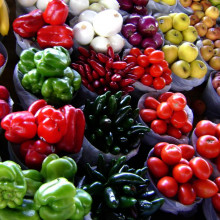
Do we really need vitamins?
John - Vitamins and trace minerals are more than just the spice of life. Most of them are essential for human life, but are only needed in small amounts. They all have very different jobs to do but are essentially helping the cells in your body to read your DNA correctly, allowed proteins like enzymes to work properly and reduce the damage to your body caused by stress.
Khalil - Vitamins and minerals are important for some pretty fundamental functions in your body. Alas! Man cannot live on bacon alone. But what actually are these nutrients that we can't live without?
John - Minerals are mostly metal elements like zinc and iron whereas vitamins are molecules made up of carbon, oxygen, hydrogen, and sometimes nitrogen.
Khalil - These four elements are the most abundant in the human body. But because we don't have the right biochemical machinery to make vitamins from scratch, we need to get them from our diet. But is it possible to stop piling nutrients or do we need a constant supply?
John - Some like vitamins A and B12 can be stored in the body, usually in the liver. But others such as zinc must be constantly supplied in your food.
Khalil - The reason that some nutrients can be stored and others can't is down to their solubility. Fat soluble nutrients like vitamin A can be stored whereas water soluble ones like vitamin C are too readily excreted to keep hold of. What happens if your supply runs out or your intake isn't enough? Scurvy ridden pirates and Victorian children with rickets spring to mind.
John - Severe deficiencies can cause dramatic visible effects such as loss of hair, skin cells, birth defects and even death. But mild deficiency may cause for example slow growth, poor eyesight, weak immunity and decreased resistance to cancer and heart disease.










Comments
Add a comment